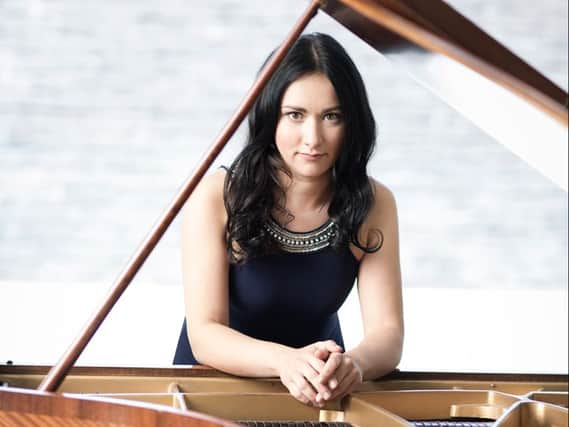REVIEW: Halloween Concert by Worthing Symphony Orchestra at The Assembly Hall


I can’t recall WSO doing a Halloween Concert before. They’ve probably been too frightened. It’s taken them 90 years, but it’s happened now. Artistic director John Gibbons summoned the courage to dip his toe into the eerie eve. Another next year looks probable. Without bed knobs, but possibly broomsticks.
There were new adult faces in the audience, as well as children up for some fun. There were some the tall pointed hats and scary wigs. Pumpkins with lights twinkling inside lined the stage. And a mysterious but kindly Afternoon Tea Witch suddenly appeared on stage at the end to present Dinara Klinton with a benign gift plant after she played Rachmaninov.
Advertisement
Hide AdAdvertisement
Hide AdKlinton, a Ukrainian with jet-black hair but innocent in a long scarlet gown with a disarming sparkly top, thankfully seemed unshocked. Her contract must have contained warning and explanation about occasionally unbuttoned British eccentricity.
The Noonday Witch had already been. At the cost of a child’s life, she had done her damnedest in Dvorak’s graphic fairytale told by Gibbons before enaction by the WSO. It’s easy to follow and worth repeating next year, perhaps with the male bass clarinettist in transgender kit to do his depiction of the witch herself. To be the ill-fated child, the clarinettist could also be costumed (look no further than Ravel’s L’Enfant et les Sortilèges).
The pieces played made a happy abnormal programme and there was a concert magazine illustrated to match. Night on a Bare Mountain plunged the atmosphere intrepidly into the dark – the Witches’ Sabbath on St John’s Eve is the subject, and Disney commandeered it in his famous film Fantasia.
After the Dvorak, yet further horror struck. Fire and brimstone, damnation, the Dies Irae paraphrased, devilish piano writing, a conspiratorial orchestral, a concept first inspired by Berlioz’s March To The Scaffold in Symphony Fantastique. It was a piece one fears these days is unlikely to be dared in a provincial concert hall: Liszt’s dazzling Totentanz.
Advertisement
Hide AdAdvertisement
Hide AdOf the young pianists coming through in recent years including those reaching a Sussex International Piano Competition Final, Dinara Klinton would have been the automatic choice to play this, confirmed by the admiring top-rank reception to her March CD release of Liszt’s Transcendental Studies. She combines brazen fire with dissolving tenderness, and the related qualities that won her an invitation from the great Martha Argerich to the Lucerne Festival flared into incendiary evidence in Totentanz.
WSO leader Julian Leaper stepped out of the shadows as the violinist fiend in Saint-Saens’ familiar, tongue-in-cheek Danse Marcabre. Another Dies Irae reference, midnight tolling on the bell, skeletons liberated from their graves, cockcrows summoning them back. But bags more colour than black and white, as with all the pieces served up this adventurous afternoon.
Next we found Tchaikovsky’s Dance of The Little Swans, quartetting under the evil spell of von Rothbart. But so briefly it seemed an oddity. Maybe the finale of Swan Lake, with its denouement battle, will make its striking mark in a future WSO concert, but at least the Cygnets Dance reminded us that Swan Lake is far from just sweet white feathers everywhere and a princess who got lucky, or maybe unlucky.
Satisfyingly cast last, the Rachmaninov was the day’s final take on the Dies Irae – balanced with the sudden glory of the heart-conquering 18th variation emerging from the sinister 17th. Klinton was unsentimentally sensitive here, allowing the music’s famous flavour and effect to be individually shaped, or cherished again, by each listener. But throughout, the work stimulated her searching affinity with the virtuosity and emotional power of the toughest and most beautiful romantic piano writing.
Advertisement
Hide AdAdvertisement
Hide AdShe is already hotly awaited in 2017 as the next Worthing Symphony Society ‘Interview Concert’ guest.
Future WSO
Sunday November 13 (Remembrance Day, 2.45pm): Copland’s Fanfare for the common man; Elgar’s Sospiri (sighs); Sibelius’ Finlandia; Alwyn’s Tragic Interlude; Butterworth’s the Banks of Green Willow; Laura Rossi’s The Battle of The Somme film score, accompanying the historic 1916 Imperial War Museum film of the same name shown on big screen. Butterworth died in the Battle.
Tuesday December 6 (7.30pm): Tchaikovsky’s The Nutcracker, exerpts; Tasmin Little plays Szymanovsky’s romantic 1st Violin Concerto; Rachmaninov’s 2nd Symphony.
Viennese New Year on Sunday January 2 (2.45) and Nicola Benedetti playing the Beethoven Violin Concerto on Thursday January 12 (7.30).
Box office 01903 206206
Advertisement
Hide AdAdvertisement
Hide AdDon't miss out on all the latest breaking news where you live.
Here are four ways you can be sure you'll be amongst the first to know what's going on.
1) Make our website your homepage
2) Like our Facebook page
3) Follow us on Twitter
4) Register with us by clicking on 'sign in' (top right corner). You can then receive our daily newsletter AND add your point of view to stories that you read here.
And do share with your family and friends - so they don't miss out!
Always the first with your local news.
Be part of it.